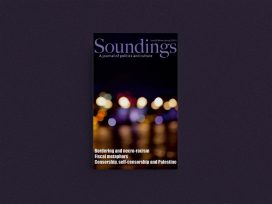Prime Minister Borut Pahor recently signed an arbitration agreement between Slovenia and Croatia in Stockholm on determining the border between the two countries. A constructive compromise will put an end to a continuing conflict which has detracted from the credibility and international reputation of both countries, the Foreign Ministry reported. Meanwhile the prime minister could not refrain from self-praise. “This is a masterpiece of Slovenian diplomacy,” he self-confidently boasted.
Slovenian politicians, as well as the public – both lay and expert, are deeply divided on the issue. Not only do they not all view it as a masterpiece, some speak of treachery and threaten a referendum in order to verify the will of the people. Whereas the prime minister believes that further procedures and of course arbitration itself will bring a result to Slovenia’s benefit, critics hold the opposite opinion. The same is true of the Croatian side. It appears that the entire political spectrum of parties is aware that the will of the majority of citizens will decide differently. However detailed, firm and committed the diplomatic corps of the Foreign Ministry may be to the idea that Slovenia is apparently opening up not just a new chapter but a whole new book in the history of bilateral relations between Slovenia and Croatia, it is highly probable that it will fail in the face of the weight of the referendum-tested opinion of Slovenes. It appears that Pahor has resigned himself to this possibility, even though at the moment he is led by the conviction that the best possible solution will be adopted.
When the referendum takes place, as it very likely will, we will once again raise the constantly recurring question: what kind of skill does the opinion of the majority have for managing public affairs? Why in the face of it do we back down from even the most righteous of acts? I will not even try to assess the quality and correctness of the arbitration proposal here since it is irrelevant to the discussion. A referendum is a form of direct decision by voters on the constitution, the law or other legal act, and an issue which is of significance to society. But as such it primarily represents, or rather is bound by, the opinion of the majority. Majority opinion is not the same as knowledge, and by philosophical definition it is not committed to the truth. It can even be on the other side of the truth. George Orwell once said that the truly frightening aspect of totalitarianism lies not in its crimes but in its attack on the concept of truth. Whatever totalitarianism does, its ambition is to control the past truth as well as the past. For this reason the truth is the greatest victim of totalitarian regimes. On the other side we have the pluralism of opinions as the basis of political judgments, and as Hannah Arendt noted, it is a natural state: the avoidance of absolute truth is essential. Put another way, in her view the truth as a premise is hostile to pluralism, which later led her critics, among them Jürgen Habermas, to criticisms that this makes it impossible to ensure the truthfulness and validity of given assertions. In his view, Arendt opened up a gaping hole between knowledge and opinion which cannot be closed with arguments.
We can read about all this in her article “Truth and politics”, as well as in her less well known essay “Philosophy and politics”. Plato’s contrast between knowledge (episteme) and opinion (doxa), or rather between opinion and truth, is of course well known and elucidated in his political philosophy. Arendt attempts in her own way to rehabilitate the concept of opinion, for the purpose of which she reads Socrates versus Plato, and seeks refuge in the invention of what she calls “the truth of opinion”. Her motivation is simple: to replace the difference between those who know and do not act, and those who know and act, in which she follows Plato with something that does not establish sharp distinctions between action and knowledge, since this denies freedom and plurality and is at the roots of all theories of domination and conceptions of politics, conceived of as Herrschaft. As Arendt states, the contradiction between truth and opinion is definitely the most anti-Socratic conclusion which Plato drew from the condemnation of Socrates. In her opinion, then, Socrates’s life and teaching completely contradict Plato’s original thought.
Of course the possible upcoming referendum is just the latest in a series of cases which we could cite as an illustration of the antagonism between the people and an expert class, between the uncertainty of knowledge and the certainty of expertise, between opinion and truth. And we should not be wholly convinced that Arendt is right. It is already the case that democracy is always just the rule of the people. Because what counts is the voice of opinion, and truth is already threatened due to the very nature of opinion. But this is what, after one reading, the Platonic idea is like, undisputedly committed to an antidemocratic mood, and sceptical towards what we call the tyranny of the majority. It appears that the Slovenian right, whether or not they are in power, prefer increasingly to use this kind of instrument. Referendums are the last bastion of conservatism and above all a way of asserting its populist and demagogic ambitions. Because they are a form in which what becomes important is only the opinion of the majority, and because it is easier to form opinions than to build knowledge, since there is no need to make an argument based on evidence, referenda become a natural substrate for expanding the rule, or one might even say the tyranny, of opinion. And because they are based on the same gesture of validating the feelings of citizens as, for example, parliamentary or other elections, they are just one variation of that same democratic quality: referenda are used to confirm why single women should not have access to artificial insemination, why the erased are not entitled to justice and compensation, why homosexual partners and spouses may not adopt children.
And this in the end leads to a bitter awareness: not trusting opinion very often means not trusting in democratic fundamentals. This is something many people do not wish to say aloud, since it would be immediately denounced for its antidemocratic spirit. Even called totalitarian, although it was no one’s ambition to speak of “absolute truth.” Thus it is not a coincidence that especially the right and conservatives like to take credit for their democratic virtues, and in so doing can barely keep up with their persistent desires to call for referenda. For this reason it may well happen that the arbitration agreement, which the current rulers honour as a grand accomplishment putting an end to several decades of blind alleys in resolving bilateral relations, will in fact set things back to square one. To be followed by new stages of blind alleys and detours which could well last for many long years. The tyranny of opinion will last for as long as we accept it as the last instance of our common decisions. Which likely means: for an immeasurably long time.






